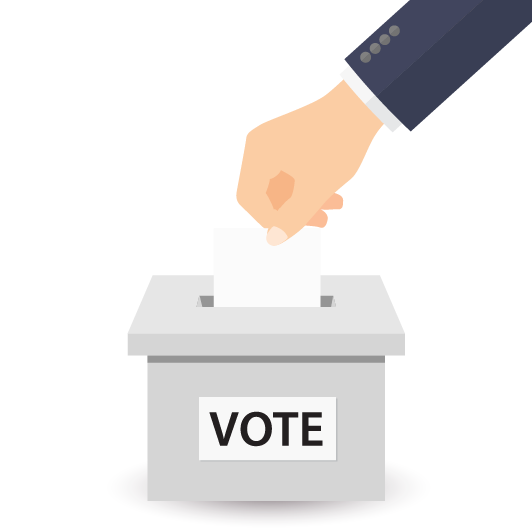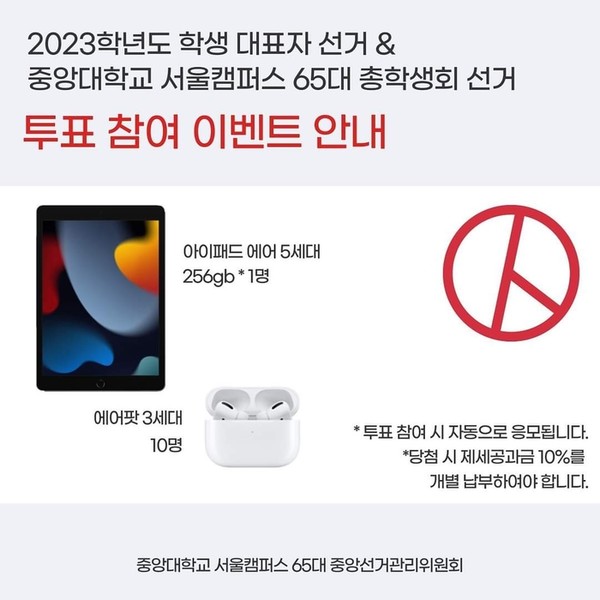Either way, We Need to Come Up With a Fundamental Solution

At the 65th student council election held on November 22nd and 23rd, the Central Election Management Commission (CEMC) announced through social media and text messages that prizes such as iPads and AirPods would be given to a few students who voted in the student council election, chosen at random. Under this policy a lot of controversy about the giveaway lottery arouse on Everytime. Students pointed out that it was appropriate to use ballot paper as lottery tickets. Let’s take a closer look at the problem of increasing voter turnout through prize lottery events, and seek for more fundamental solution to increase voting.
1. Prize Give Aways: An Act of Ticketing, or Encouragement for Voting?
According to the minutes of the 32nd central emergency committee system meeting on November 14th, 2022, it was unanimously decided to give prizes in order to ‘ascertain public elections'. Afterwards, a notice was posted on Instagram and Everytime that an iPad Air and AirPods would be given randomly as prizes when students vote in the 65th Student Council election. In campus elections, voter turnout has a significant impact on whether a candidate wins or loses. If the voter turnout does not reach 50%, a re-vote or an emergency committee system will be held. Some criticized that inducing voting with material rewards is not desirable. This is because such incentives cannot be seen as an arbitrary expression of democratic intentions. Trying to increase voter turnout under the pretext of a lottery can seen as an act of buying tickets with money. In addition, the increase in the number of people who are not interested in student autonomy, but who participate in voting for the purpose of drawing prizes may be a factor that deteriorates the function of forming a public sphere. Article 3 of the ‘Chung Ang University Student Council Election Taxation’ stipulates that “the student council election should function as a public forum for members to exchange and establish their opinions on the meaning, function, and goals of the student council.” In this respect, the prize lottery event seems to degrade the function of forming a public sphere through voters' discourse.

2. The Election Commission that Only Focuses on Raising Voter Turnout Missing the True Nature of Election.
It is not only the prize lottery events during the election that excited considerable comments. The simplicity of the policies implemented to increase voter turnout is also being questioned. Among them, the sudden change in the range of voters caused resentments from students. The change in the range of the electorate presented in the agenda materials released by the CEMC also intensified the arguments for and against. While the agenda released in April included exchange students, industry-university collaboration interns, and international students in the range of voters, the resolution agenda released in November classified them as “additional voters” so they would not affect the total voter turnout even if they did not vote. There is considerable student resistance to this system. On November 30th, a student of the Department of English Language and Literature posted a wall poster requesting clarification from the CEMC about the sudden change in voters’ range. These changes promoted by the CEMC show that they are currently focusing on increasing voter turnout rather than finding the basic cause of the drop in voter turnout.
3. Finding a Practicable Way to Increase the Voter Turnout.
a. Giveaway Lottery Events are Common in CAU
The prize draw event was not only held by the student council but also by many colleges in CAU. In the case of the College of Business & Economics, a prize draw event was used from the 10th Student Council President election held in 2020 to the 12th election held in 2022. Prizes ranged from electronic devices such as Apple Watches and AirPod Pros to fried chicken mobile gifts (gifticons). The prize lottery turned out to be effective in increasing voter turnout. Colleges that held such events achieved at least 50% voter turnout, but colleges that did not hold events failed to achieve turnout, which led to the establishment of an emergency committee. The student council elections held so far also show that the presence or absence of prize draws has a great impact on voter turnout. For the last 2019, 2020, and 2022 elections where prize lottery events were held, a student council was formed with a turnout of more than 50% and a majority of votes cast. However, in the case of the 2021 election, when the prize draw event did not take place, an emergency committee system was formed due to the unattainable turnout.
b. Cases of Other Universities
Sungkyunkwan University (SKKU) also provided goods to encourage voting in the student council election held from November 22nd to 24th, 2022. SKKU’s election commission promised to send out Starbucks gift icons to all students who voted, as well as providing notebooks and masks once voting was verified. Kangnam University also conducted a prize lottery election campaign. iPads, Apple Watches, and AirPods were given as prizes through a lottery for students who completed all of the election for student council, and undergraduate/department elections. Both of these universities, which held prize draws, achieved 50% voter turnout and student councils were formed. Given that Sogang University and Hongik University, which did not hold prize draws, formed an emergency committee system due to low turnout, it can be said that the prize draws events do increase voting participation increasing turnout. However, it is unclear whether the votes cast to receive prizes without proper political participation will help form a democratic public sphere.
4. Prize Lottery Can Not Be a Fundamental Solution to the Problem
According to the ‘counting’ section of the election administration released by CEMC, “If the total turnout rate is less than 50%, the vote will be held for one extra day only under agreement of CEMC members. If the voter turnout does not exceed 50% even after the extended vote, the CEMC discusses and decides whether to hold a re-election. Even if only a single candidate runs to be a student representative, if the voter turnout does not record 50%, the student council cannot be elected.” Voter turnout of in-campus elections has been declining in recent years. This tendency may reflect a number of factors including disenchantment with available choices, lack of time to pay attention to student self-government due to unemployment crisis or career concerns. Rather than simply trying to increase the visible turnout with extrinsic motives, it seems more important to think about why students do not vote.
There is an ongoing conflict among students claiming that the giveaway event during student council election is an educational measure to increase voter turnout, and the other side that refutes it is an act of ticketing that ruins the formation of a democratic sphere among students. As an election becomes meaningful only when a certain turnout rate (50%) is achieved, it is understandable that related organizations are trying to promote voter participation even through prize draws. However, it seems necessary to discuss the effectiveness and legitimacy of the event, and it seems more urgent to come up with practical measures to resolve voters' indifference to student autonomy.

